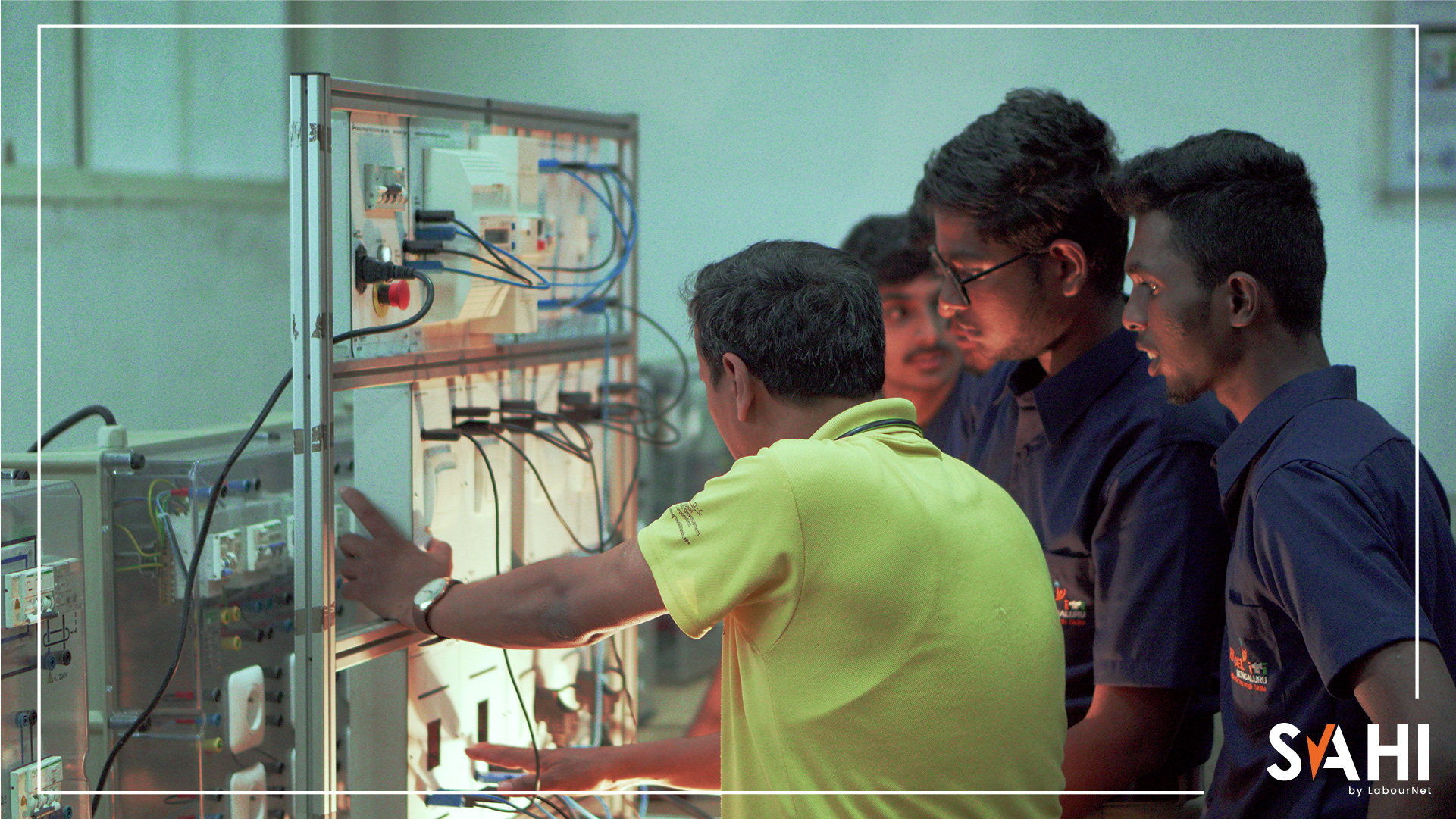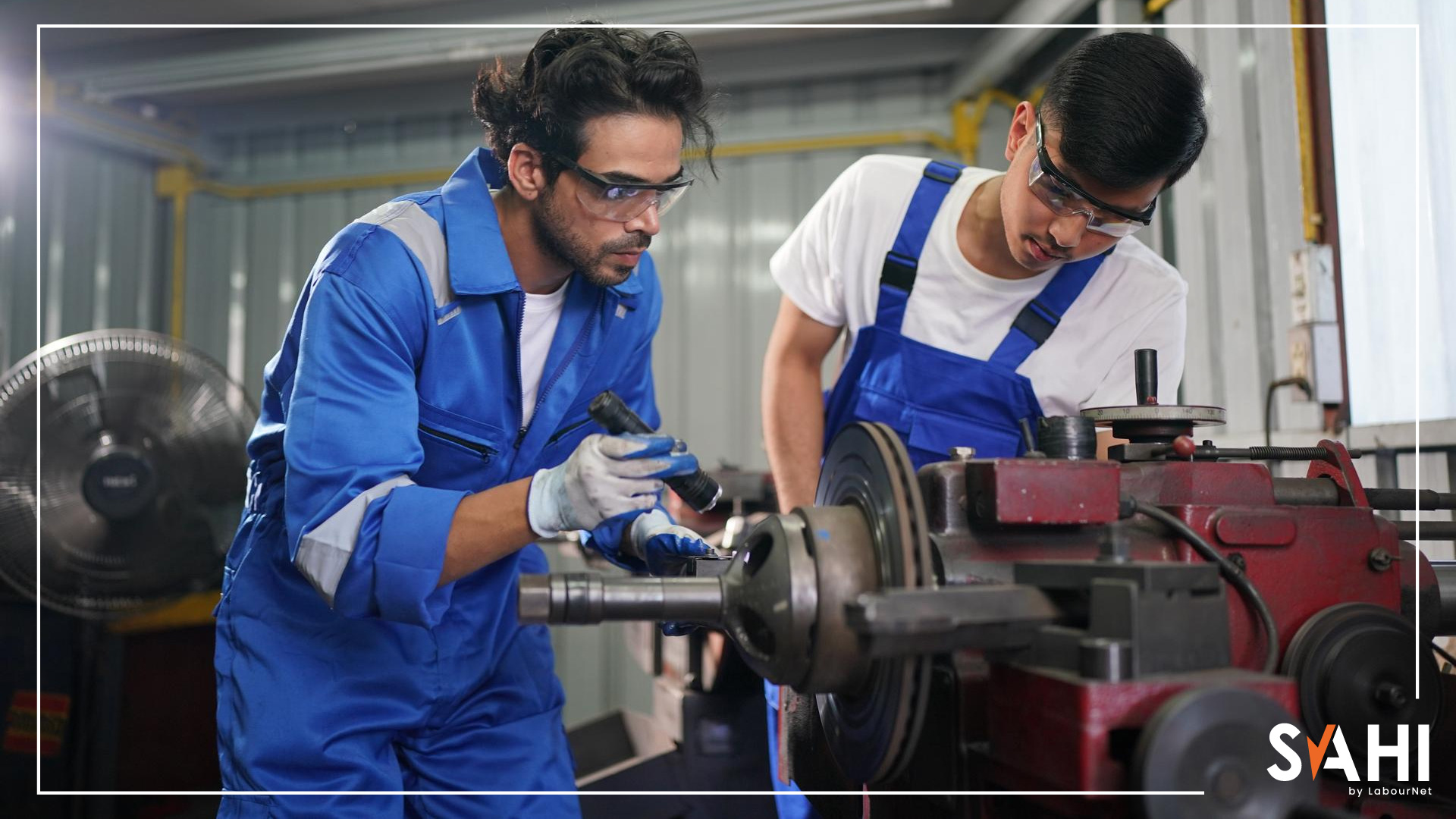Staying ahead in the race of innovation and technology is paramount for businesses in the manufacturing sector.
The sector has been witnessing a rapid transformation driven by technological advancements.
This rapid change, however, brings forth significant challenges, particularly in maintaining a workforce that is adept and up-to-date with emerging skills.
Skill development in India, especially in manufacturing, is grappling with the persistent issue of skill obsolescence. Traditional employee training and development methods are no longer sufficient to keep pace with the demands of modern manufacturing environments.
The solution lies in a strategic shift towards more dynamic training solutions.
Enter Instructor-Led Blended Training (ILBT). It’s an innovative approach that seamlessly integrates the benefits of face-to-face instruction with the flexibility and scalability of digital learning.
This model is a response to the immediate need for workforce upskilling, providing a forward-looking strategy that ensures continuous learning and adaptability.
As industries strive to bridge the skills gap and enhance their workforce development skills, ILBT promises to revolutionise the way employee training is perceived and delivered in the manufacturing sector.
The Critical Challenge of Managing Rapid Skill Obsolescence
Outdated skills stand as a formidable barrier to progress.
This phenomenon, where once-valued skills become redundant due to technological advancements, is a significant concern for industries committed to workforce upskilling.
As manufacturing techniques evolve at an unprecedented pace, the skills of blue-collar workers that were relevant yesterday may no longer suffice tomorrow.
This reality necessitates a proactive approach to upskilling the workforce and training development, ensuring that the workforce remains competent and competitive. Addressing this issue head-on, India’s manufacturing sector is increasingly recognizing the importance of continuous skill development.
The crux of the matter lies in updating skills while doing so in a manner that is both efficient and effective.
It’s here that innovative training solutions, particularly those focused on virtual micro-learning and blended training approaches, play a pivotal role.
These methods are integral to ensuring that workforce development skills remain relevant, adaptable, and in sync with the ever-changing demands of the industry.
The Concept of Instructor-Led Blended Training (ILBT) as a Solution
Instructor-Led Blended Training (ILBT) emerges as a robust solution to the challenge of rapid skill obsolescence in manufacturing.
This innovative approach to employee training and development ingeniously amalgamates the traditional instructor-led training’s personal touch with the versatility and reach of digital learning.
ILBT is designed to meet the unique requirements of skill development in India particularly in the manufacturing sector. It ensures that training solutions are comprehensive while being deeply engaging and effective.
- The core idea of ILBT is to enhance workforce upskilling by creating a balanced learning environment.
- It combines the immediacy and interactive nature of classroom learning with the flexibility and accessibility of online modules.
- This dual approach allows for a more profound and sustainable impact on the learning process
- It caters to diverse learning styles and needs.
- By integrating virtual micro-learning elements, ILBT ensures that the skills of blue-collar workers are continuously updated
Thus, it’s an invaluable tool in the arsenal of training development strategies for the modern workforce.
The ILBT Advantage in Manufacturing Training: Detailed Explanation of ILBT and its Components
At its core, ILBT seamlessly integrates the personal engagement of traditional instructor-led sessions with the technological prowess of digital learning platforms.
This combination addresses the skill development needs in India’s rapidly evolving manufacturing sector. And it revolutionises the standard employee training and development paradigm.
ILBT’s components are strategically designed to cater to various learning preferences while keeping pace with industry demands.
The instructor-led element provides a hands-on, interactive experience, vital for understanding complex manufacturing processes and machinery. This is complemented by digital modules, which offer flexibility and accessibility, essential for training solutions in today’s fast-paced world.
These modules often include elements of virtual micro-learning, breaking down complex topics into manageable, bite-sized pieces, and enhancing retention and application of skills for blue-collar workers.
By integrating these diverse components, ILBT ensures a comprehensive and adaptable training development strategy.
Thus, it becomes critical for equipping the workforce with the necessary skills to thrive in the modern manufacturing landscape.
Benefits of ILBT in Manufacturing
Instructor-Led Blended Training (ILBT) offers pivotal benefits in the manufacturing sector, particularly in enhancing adaptability to technological changes and improving engagement and retention of training content.
As industries continually evolve with new technologies, ILBT equips the workforce with the agility to adapt quickly.
This training model, integral to workforce upskilling, ensures that employees are aware of the latest technological trends. It also proves proficient in applying them in real-world scenarios.
Such adaptability is crucial for maintaining a competitive edge in the manufacturing industry.
Moreover, ILBT’s combination of hands-on instruction and interactive digital content significantly improves engagement and retention.
Such an approach to employee training and development caters to various learning styles, making complex manufacturing concepts more accessible and memorable.
The use of virtual micro-learning components in ILBT further reinforces learning outcomes, enabling workers to retain and apply new skills effectively.
This enhanced engagement and retention are vital for developing a skilled and confident workforce, ready to meet the challenges of modern manufacturing.
Overcoming Traditional Training Limitations in Manufacturing
In the Indian manufacturing industry, traditional training methods have long been the only source of employee development.
These methods predominantly revolve around conventional classroom settings, where instructors impart knowledge in a structured environment. However, the limitations of this approach have become increasingly apparent.
- One significant drawback is the tough and exhausting nature of these sessions, often leading to disengagement and ineffective learning.
- Additionally, traditional training suffers from time management issues, struggling to adapt to the dynamic and ever-changing corporate environment.
- It lacks the agility needed for rapid skill adaptation and fails to offer learning opportunities beyond the classroom.
- Another critical limitation is the demanding nature of resources required for traditional training.
- From substantial budgets for materials and trainers to the rigidity in workforce schedules, these methods can significantly impact organisational resources.
- Furthermore, traditional training often leads to barriers in knowledge retention, with employees finding it challenging to recall complex lectures and apply them in practical settings.
This limitation affects learning effectiveness and employee retention, as opportunities for professional growth influence decisions to stay in current positions.
Hence, it points to the need for more innovative, flexible, and effective approaches like ILBT. Solutions that address these challenges by offering a more engaging, adaptable, and resource-efficient training model.
ILBT vs Traditional Training: A Comparative Analysis in Addressing Current Skilling Needs
When comparing Instructor-Led Blended Training (ILBT) with traditional training methods in manufacturing, several key differences highlight the superiority of ILBT in addressing the current needs of workforce upskilling and skill development in India.
| Traditional Training | Instructor-Led Blended Training |
| Traditional training is often confined to classroom settings. | ILBT combines the personal interaction of instructor-led sessions with the convenience and scalability of virtual micro-learning. |
| Struggles with flexibility and adaptability. | It accommodates diverse learning styles and allows for the integration of current industry trends and technologies. |
| Customising content for different types of audiences is not possible. | ILBT can be tailored to individual learning paces and schedules |
| Traditional classroom training is resource-intensive. | ILBT is cost-effective. |
Embracing the Future: Steps and Considerations for Manufacturing Firms Transitioning to ILBT
For manufacturing firms looking to transition to Instructor-Led Blended Training (ILBT), a strategic approach is essential.
- The first step involves assessing the current skill levels and training needs of the workforce
- Aligning with the objectives of workforce upskilling and skill development in India.
- This assessment should identify specific areas where ILBT can be most beneficial.
- Next, firms should invest in the necessary digital infrastructure and resources to support virtual micro-learning, a key component of ILBT.
- This includes ensuring access to online learning platforms and creating digital content tailored to manufacturing training needs.
- Additionally, it’s important to train instructors in both traditional and digital pedagogies, ensuring they can effectively deliver ILBT’s blended approach.
- Engaging employees in the transition process, perhaps through pilot programs or introductory sessions, can help ease the shift and garner support.
- Finally, continuously monitor and adapt the ILBT program based on feedback and changing industry trends, ensuring the training remains relevant and effective.
This forward-looking approach is crucial for maintaining a skilled, adaptable, and future-ready workforce in the manufacturing sector.
Demonstrating SAHI’s Expertise in ILBT and Workforce Development
SAHI, a pioneer in the field of workforce development and skill enhancement, has been instrumental in bringing the Instructor-Led Blended Training (ILBT) model to the forefront of the Indian manufacturing sector.
Recognized for its innovative approaches in employee training and development, SAHI’s implementation of ILBT stands as a testament to its commitment to revolutionising workforce upskilling.
Its expertise in integrating traditional instructor-led training with the latest digital learning technologies addresses the crucial need for adaptable and scalable training solutions.
SAHI’s role extends beyond just imparting skills. It focuses on creating a training ecosystem that is responsive to the evolving technological landscape of manufacturing.
By offering ILBT, SAHI bridges the skills gap and ensures that the workforce is equipped with the necessary tools to thrive in a rapidly changing industry.
Its approach to workforce development skillfully combines the immediacy of face-to-face instruction with the flexibility of virtual micro-learning. Thus, SAHI is a key player in shaping the future of manufacturing training in India.
Case Study: SAHI’s ILBT Implementation in JSW
JSW Group, a prominent player in sectors like Steel, Energy, Infrastructure, and more, faced a pivotal challenge in integrating gig workers into their mainstream workforce.
Acknowledging the necessity of upskilling these workers to adapt to modern fabrication methods and advanced technology, JSW embarked on a transformative upskilling program in collaboration with LabourNet, leveraging the power of ILBT.
Client Introduction
JSW Group, renowned for delivering high-quality services across diverse sectors, identified a significant gap in the skillset of their gig workers.
These workers, essential to JSW’s operations, needed an upgrade in skills to match the evolving technological landscape in manufacturing.
Problem Faced
The core challenge for JSW was to enable their associated workers, primarily involved in gig work, to align with the latest fabrication techniques and technologies.
The objective was to integrate these workers into the mainstream workforce, thereby enhancing their career progression opportunities.
Solution Provided
To tackle this, JSW and LabourNet initiated an upskilling training program centred around the Recognition of Prior Learning (RPL).
This program was designed to assess the existing skills of JSW’s workers and supplement their knowledge with training in modern fabrication tools and techniques. The focus was on bringing their skills up to date, thus paving the way for new career pathways and better integration into the workforce.
Job Roles Trained
Throughout this intervention, approximately 603 employees were skilled and upskilled in various roles, including distribution sales, IHB fabrication, IHB masonry, and upskilling of contractors and engineers.
This comprehensive training significantly enhanced their ability to adopt modern fabrication methods and technologies, equipping them to meet the new challenges in the manufacturing industry.
Testimonial from the JSW Team
JSW’s team acknowledged the high value of the Fabrication Training Centre, emphasizing the advanced skills and knowledge imparted to their fabricators.
The transition from conventional to modern fabrication methods was seamless, thanks to a workforce now aligned with contemporary tools and techniques. This partnership between JSW, TGMA, and training partners fostered a mutually beneficial relationship, enhancing overall productivity.
Conclusion
JSW Group’s collaboration with LabourNet marks a significant step in workforce development.
The upskilled workforce now confidently utilizes modern methods and tools, contributing to increased productivity and efficiency. This initiative strengthened the relationship between JSW and its workers while positioning the company as a committed investor in its workforce’s growth.
Consequently, this aligns with the industry’s advancement, creating a more skilled, competitive workforce in the manufacturing sector. And demonstrates the efficacy and impact of SAHI’s ILBT approach.
The Strategic Value of ILBT with SAHI and its Broader Implications
The strategic value of Instructor-Led Blended Training (ILBT) in revolutionising manufacturing training is undeniable.
SAHI, through its innovative approach, has demonstrated how ILBT can bridge the gap between traditional training methods and the evolving needs of the manufacturing industry.
The benefits of ILBT, including enhanced adaptability to technological changes, improved engagement, and effective skills retention, are pivotal.
SAHI’s role in implementing ILBT has uplifted the skillset of the workforce and set a benchmark in workforce upskilling and development. This transformative impact of ILBT extends beyond individual organisations.
In fact, it contributes significantly to the broader advancement and competitiveness of the manufacturing sector in India.
Future Outlook for Workforce Training and Development
The future of workforce training and development in India is poised for a major overhaul, with a significant emphasis on innovative methodologies like ILBT.
As industries increasingly confront rapid technological advancements and shifting market demands, the need for a dynamic, adaptable workforce becomes paramount.
The focus will be on upskilling, continuous learning, and adaptability, ensuring that the workforce is future-ready.
This rise of digital platforms and virtual micro-learning will further democratise access to quality training, making it more inclusive and widespread. Such an evolution is expected to foster a more skilled, versatile, and technology-adept workforce, essential for maintaining India’s competitive edge in the global market.
Moreover, initiatives such as ILBT will play a crucial role in harmonising theoretical knowledge with practical skills. Thereby, it proves essential for the emerging blue-collar and gig economy in India.
Ready To Revolutionise Your Workforce Training Approach?
Discover how SAHI’s Instructor-Led Blended Training solutions can elevate your manufacturing training to new heights.
Visit our website or contact us today to learn more and take the first step towards a skilled, future-ready workforce.


